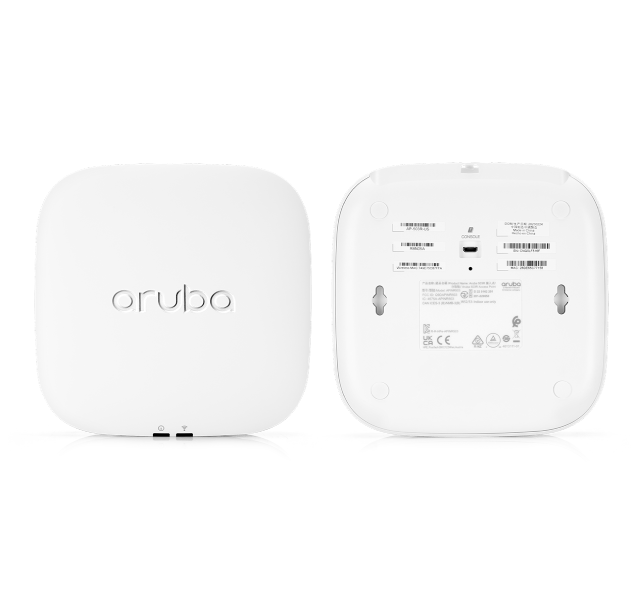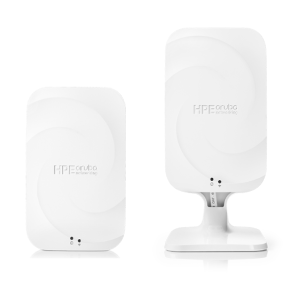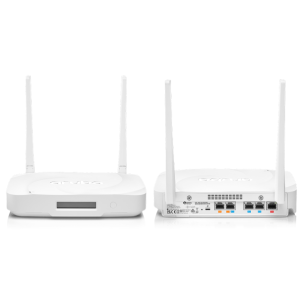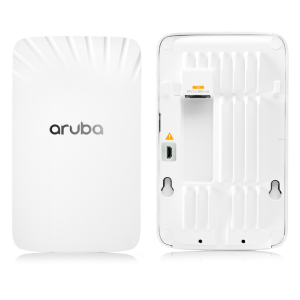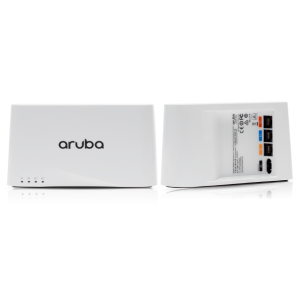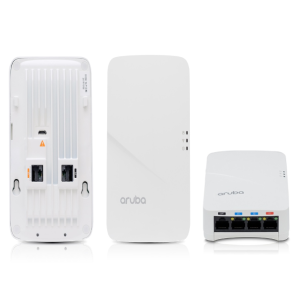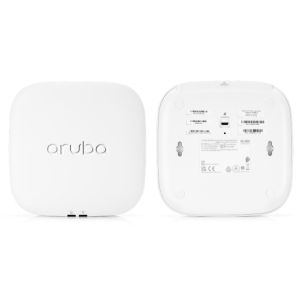AP type:
-
- Indoor, dual-radio, 2.4GHz and 5GHz (dual concurrent) 802.11ax 2×2 MIMO
2.4GHz radio:
-
- Two spatial stream Single User (SU) MIMO for up to 574Mbps wireless data rate with 2SS HE40 802.11ax client devices (287Mbps for HE20)
5GHz radio:
-
- Two spatial stream Single User (SU) MIMO for up to 1.2Gbps wireless data rate with 2SS HE80 802.11ax client devices
Up to 256 associated client devices per radio, and up to 16 BSSIDs per radio
Supported frequency bands (country-specific restrictions apply):
-
- 2.400 to 2.4835GHz ISM
- 5.150 to 5.250GHz U-NII-1
- 5.250 to 5.350GHz U-NII-2A
- 5.470 to 5.725GHz U-NII-2C
- 5.725 to 5.850GHz U-NII-3/ISM
- 5.850 to 5.895GHz U-NII-4
Available bands and channels: Dependent on configured regulatory domain (country)
Dynamic frequency selection (DFS) optimizes the use of available RF spectrum in the 5GHz band
Supported radio technologies:
-
- 802.11b: Direct-sequence spread-spectrum (DSSS)
- 802.11a/g/n/ac: Orthogonal frequency-division multiplexing (OFDM)
- 802.11ax: Orthogonal frequency-division multiple access (OFDMA) with up to 8 resource units
Supported modulation types:
-
- 802.11b: BPSK, QPSK, CCK
- 802.11a/g/n: BPSK, QPSK, 16-QAM, 64-QAM and 256-QAM (proprietary extension)
- 802.11ac: BPSK, QPSK, 16-QAM, 64-QAM, 256-QAM and 1024-QAM (proprietary extension)
- 802.11ax: BPSK, QPSK, 16-QAM, 64-QAM, 256-QAM and 1024-QAM
802.11n high-throughput (HT) support:
802.11ac very high throughput (VHT) support:
802.11ax high efficiency (HE) support::
Supported data rates (Mbps):
-
- 802.11b: 1, 2, 5.5, 11
- 802.11a/g: 6, 9, 12, 18, 24, 36, 48, 54
- 802.11n: 6.5 to 300 (MCS0 to MCS15, HT20 to HT40), 400 with 256-QAM (proprietary extension)
- 802.11ac: 6.5 to 867 (MCS0 to MCS9, NSS = 1 to 2, VHT20 to VHT80); 1,083 with 1024-QAM (MCS10 and MCS11, proprietary extension)
- 802.11ax (2.4GHz): 3.6 to 574 (MCS0 to MCS11, NSS = 1 to 2, HE20 to HE40)
- 802.11ax (5GHz): 3.6 to 1,201 (MCS0 to MCS11, NSS = 1 to 2, HE20 to HE80)
802.11n/ac packet aggregation:
Transmit power:
-
- Configurable in increments of 0.5 dBm
Maximum (aggregate, conducted total) transmit power (limited by local regulatory requirements):
-
- Per radio (2.4GHz / 5GHz): +21 dBm (18dBm per chain)
- Note: conducted transmit power levels exclude antenna gain. For total (EIRP) transmit power, add antenna gain.
Advanced Cellular Coexistence (ACC) minimizes the impact of interference from cellular networks
Maximum ratio combining (MRC) for improved receiver performance
Cyclic delay/shift diversity (CDD/CSD) for improved downlink RF performance
Space-time block coding (STBC) for increased range and improved reception
Low-density parity check (LDPC) for high-efficiency error correction and increased throughput
Transmit beam-forming (TxBF) for increased signal reliability and range
802.11ax Target Wait Time (TWT) to support low-power client devices
|
